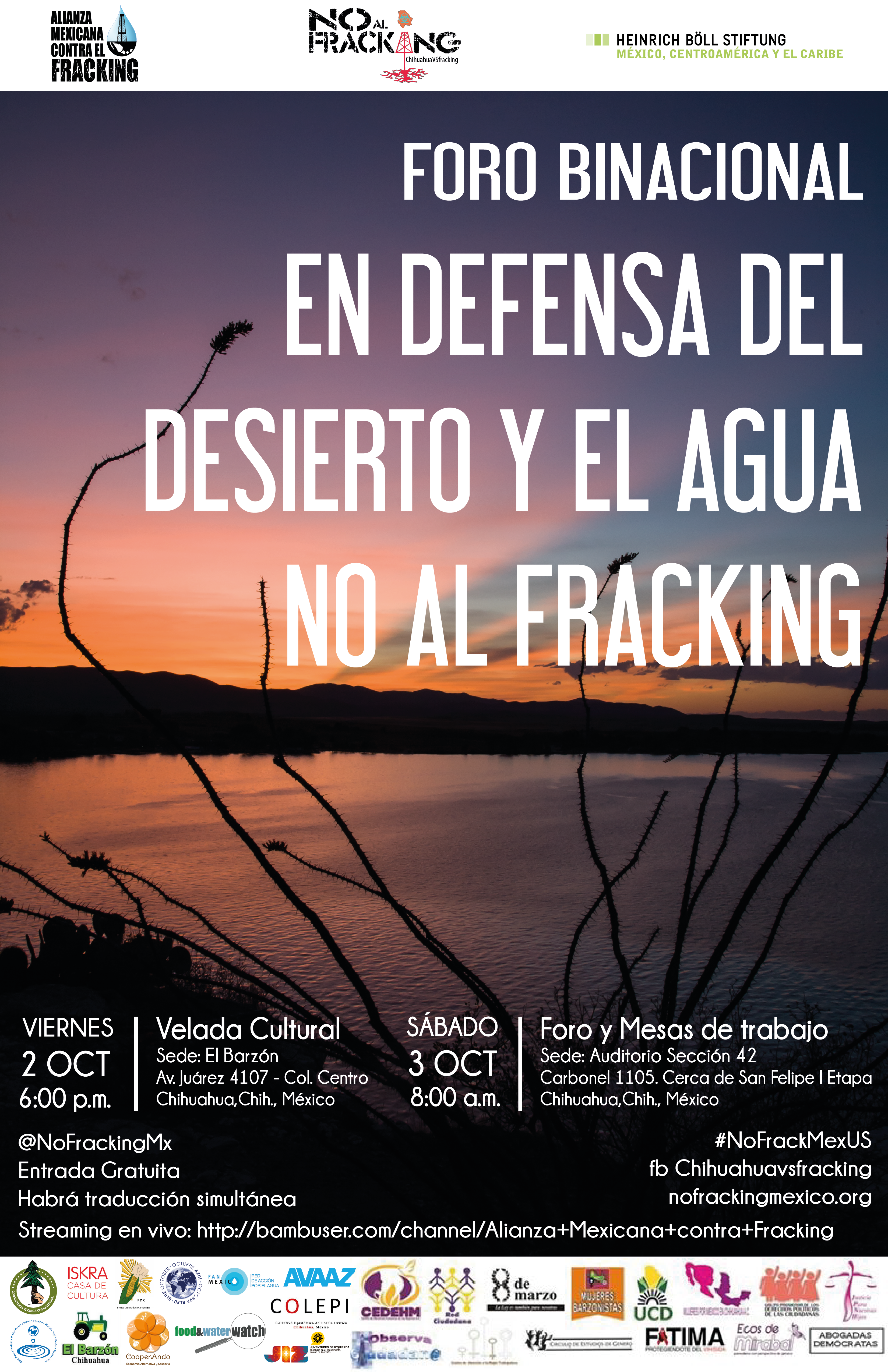Chihuahua versus Fracking, the Mexican Alliance Against Fracking and the Heinrich Böll Foundation invite the public to a forum where specialists will share scientific information about the consequences of this technology, and organizations and communities affected by fracking and/or the presence of gas ducts on their land will share their personal testimonies.
Hydraulic fracturing or fracking is a technique used to extract hydrocarbons that requires the injection of 9,000,000 to 29,000,000 liters of water for each well that is drilled. The water is mixed with sand and anywhere from 650 to 990 chemical substances, many of which are toxic and can cause serious health problems. Leakage of water contaminated with chemicals, oil and gas, together with the release of other toxic substances present in the ground pose serious risks to air, soil and water quality at all stages of the fracking process. Waste water is either stored in open-air “transfer ponds” where the toxic substances evaporate or it is injected into waste wells where the large volumes of wastewater can create earthquakes. Fracking is also responsible for the release of high levels of gases and other dangerous substances into the atmosphere, including methane gas which affects global warming much more than carbon dioxide.
In Mexico fracking has already taken place in the states of Veracruz, Tamaulipas, Nuevo León, Puebla, Tabasco and Coahuila. In the near future, the states of Chihuahua, San Luis Potosi, Hidalgo and Oaxaca could also be affected by the implementation of fracking, which will have irreversible environmental, social, and economic consequences. The extensive use and contamination of clean water is of particular concern to us.
The objectives of the binational forum “In defense of the Desert and its water. No Fracking!” are:
- to inform the public at large about the risks and impacts of fracking and the construction and use of gas pipelines
- to call attention to the problems facing Chihuahua´s desert region and the fight over its natural resources: (Valle de Juárez, Villa Aumada, Praxedis G. Guerrero, Ojinaga, Coyame del Sotol, Manuel Benavides, Aldama, Camargo, Jiménez and other regions), and
- to strengthen and articulate popular resistance struggles against fracking as well as other struggles against natural resource megaprojects.
Please join us. Simultaneous translation will be provided.
PROGRAM
Welcome and reception:
October 2, 2015,
Barzón Chihuahua, Chih.
Ave. Juárez 4107 Col Centro
from 7 to 10 pm.
Binational Forum: In Defense of the Desert and its Water. No Fracking.
October 3, 2015,
Local de la Sección 42 del SNTE.
Carbonel 1105, close to San Felipe I Etapa
8am to 7pm.
8:00 am Registration
9:00 Panel Discussion:
- What is fracking and what are its consequences? Luca Ferrari, Centro de Geociencias UNAM
- The experience of Fracking in the United States, Wendy Lee, Bloomsburg University, Pennsylvania
- Impacts of Fracking in Papantla,Veracruz, Rodolfo Bibiano, inhabitant of Papantla.
- Living with fracking in the US, TBA
Moderator: María Teresa Guerrero, CONTEC / Chihuahua vs fracking
Questions and Answers
10:30 BREAK
10:45 Work sessions.
Each work group will have a facilitator and one or two people to generate discussion and debate. The discussion will center on previously formulated questions.
Impactos al agua, aire y salud –
- Claudia Campero, Blue Planet Project, Food & Water Watch
Facilitator: Chihuahua vs. Fracking
- Employment and economic impacts–
- Julián Ramírez, Lavida (Veracruz)
Facilitator: Chihuahua vs. Fracking
- Geological Risks and Impactos–
- Luca Ferrari, Center for Geoscience UNAM
Facilitator: Chihuahua vs. Fracking
12:30 BREAK
12:45 Panel:
- Cartographic Presentation: Extractive Industries in Mexico. Manuel Llano, Cartocrítica
- The impact of gas pipelines, some examples in Mexico. Mayeli Sánchez, PODER
Moderator: Horacio Almanza Alcalde, Chihuahua vs fracking
Questions and Answers
1:30 Lunch
2:45 Work sessions.
Each work group will have a facilitator and one or two people to generate discussion and debate. The discussion will center on previously formulated questions.
- Fracking and climate change –
- Dolores Rojas, Heinrich Böll Foundation
Facilitator: Chihuahua vs. Fracking
- Gas Pipelines and associated infrastructure –
- Representatives from the Rarámuri communities of Repechike, San Luis Majimachi, and Mogótabo
- Activists defending Big Bend against the Trans-Pecos gas pipeline project
Facilitator: David Lauer
- Citizen Organizing –
- Chihuahua vs fracking and Corasón
4:45 Plenary – The relevant information from each group will be shared with attendees.
5:45 – 7:00 Final Comments.
- TBA, Chihuahua vs. Fracking
- Claudia Campero, Alianza Mexicana contra el Fracking
- Heinrich Böll Foundation












